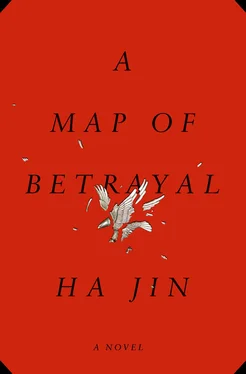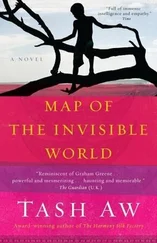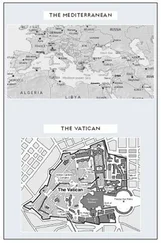The thought came to me that I might put Ben in touch with Minmin. I liked Sonya, but my father’s life had exemplified how difficult it was to live with a spouse of a different race, who spoke a different language, grew up in a different culture and social environment, and believed in a different religion. Actually, like my mother, Gary had gone to Mass regularly and even contributed ten dollars a month to our church, but I couldn’t tell if he was serious about Christianity. In his diary he never mentioned the religion, and he seemed to have remained an atheist. In all likelihood he had joined the church as a camouflage. If he were a genuine Christian, he’d have owned up to his true identity in a confessional and some pastor would have entered his life, offering spiritual guidance. But his diary didn’t mention any clergyman except Father Murray. I believed it was their common language and cultural background that had brought my father and Suzie together, and as a result, there was no way my mother could separate them. That conviction prompted me to call Ben again and tell him about Minmin. I wanted him to meet her in Beijing. I said to Ben, “You can buy a book for me and take it to her as my present. I will write her about this so she can know who you are.”
The book I suggested was The Search for Modern China , by Jonathan Spence, which, though a hefty volume, might come in handy for Minmin. It was an excellent overview of modern Chinese history and a widely used textbook in American colleges. I told Ben that he could get the book at any good bookstore, and I would reimburse him. “No need for that,” he assured me. “I will deliver the present to Minmin in person.”
That night I talked to Henry about Ben’s plan to intercede for his sister, afraid he might bungle the case, but I said nothing about Minmin. I did not intend to be overtly matchmaking, and my present for her was more or less a lark. “Don’t underestimate Ben,” Henry said. “He’s very savvy about dealing with people.”
“How can you tell?” I asked.
“I observed him when he and I went out together.” Henry’s eyes shone while a smile crossed his whiskered face. “He’ll handle everything properly. I’m not worried about him.”
“You sound like you know him better than I.”
“That’s why I hope he can manage our building someday. He’ll be good at handling the troublesome tenants.”
I couldn’t help but laugh. Henry was always nervous when he asked for overdue rent from some tenants, above all two young women. I was the one who had to go to them and ask.
BEN CALLED A WEEK LATER. He was back from China and busy catching up on work. He assured me that Juli had broken up with Wuping peacefully and was out of trouble now. Curious about the word “peacefully,” I asked him to elaborate. He said he’d met with the man and told him that if he’d jilted Juli without enough reason, there’d be consequences. Ben showed Wuping a page of information on the tax fraud committed by his father’s garbage company. Every month his old man imported shiploads of trash from Japan and Australia for $1.5 a ton and then sorted it to get recyclable materials, which he sold to Chinese factories. He netted a two hundred percent profit. Aside from breaking the tax law, he had leased out some of his garbage dumps as ranches where thousands of cows grazed on nothing but trash, and as a result, their beef was heavily contaminated, even poisonous. The old crook’s collusion with the cattlemen alone could get his company shut down and him put into jail. Despite denying any knowledge of the crimes, Wuping was shaken and came back to Ben on the same day. He offered Juli fifty thousand yuan, which settled their breakup and her unemployment.
I asked Ben, “How did you find out about his father’s tax fraud?”
“I told you I was well connected in police circles there. No fat cat in China has a clean ass. All the successful businesspeople evade taxes, otherwise how could they get rich? The police have kept track of every one of them. If they don’t behave, they’ll be brought in.”
I felt uneasy about Ben’s way of handling his sister’s affair but didn’t press him for more details. I asked, “Is Juli all right?”
“Sure, she’s back in Heilongjiang with my parents.”
“You mean she gave up her musical career?”
“She was silly and lost her heart to that playboy. She isn’t much of a singer to start with. It’s time she came to her senses.”
“You might be right.” Somehow I had always avoided thinking poorly of Juli’s musical talent. “Your parents must be happy now. Are they okay?”
“I didn’t see them. I was busy attending meetings in Beijing. But I called them. They were well and sent their regards. By the way, I met Minmin and gave her the book. She loved it.”
“She told me that.”
“You should be careful when communicating with her, Aunt Lilian.”
“Why? What’s wrong with Minmin? You don’t like her?”
“Not because of that. She is a fine person, but the military has taken an interest in her.”
“I know they offered her a lectureship, but she doesn’t want it.”
“It might not be easy for her to turn it down.”
“Really? Can’t she choose her own career?”
“It’s not that simple. Declining an offer from that kind of school is like refusing to serve our country. She might have to pay for it if she can’t give them a convincing reason.”
“You mean she’ll be treated as a dissident?”
“Something like that.”
“That’s ridiculous.”
“A lot of things in China don’t make any sense, but we have to accept them as part of life. In any event, she said she wanted to climb Mount Everest first. She’s a bit nutty.”
I didn’t know what more to say. Minmin couldn’t be that vulnerable; she had her own financial means and didn’t have to take a day job. In a couple of years she might come to the States to do graduate work. So I felt I needn’t worry too much about Minmin, to whom Ben seemed to have felt little attraction. That caught me off balance a bit, but there was no loss.
I thought more about Juli. She got fifty thousand yuan from her former lover. That was a small fortune. I remembered I had once asked my grad students at Beijing Teachers College how much scholarship money they received for living expenses. Typically each got seven hundred yuan a month, which was not much but enough for food, their major expenditure since they all had free beds in the dormitories. In fact, a small amount of money still could go a long way in China if you were thrifty and knew where to shop. Part of me was uneasy about the cash settlement Wuping had offered Juli. Didn’t she once love him? How could she be compensated for her loss so easily? On the other hand, I knew that if she stayed with her family, she’d be all right and could recover from the heartbreak eventually. In my next email I urged her not to leave home again. I wrote: “There is nothing more precious than family in this world. Stay with your parents as long as you can. They are getting on in years and need you around.”
“I understand, Aunt,” she replied.
Since the summer of 1966 Gary had lost contact with Bingwen, who had been removed from his office and made to take part in the Cultural Revolution. Where was he now? Try as he might, Gary couldn’t find out. He approached Father Murray, but the priest couldn’t get in touch with anyone in China either. The country had fallen into total disarray. No one was in charge of the overseas intelligence work anymore. Gary had read that even the top officials in the State Council were brought down by the revolutionary masses, and that some of them were put on platforms and publicly denounced, made to wear dunce caps and placards around their necks. He followed the news with a sinking heart. Besides browsing through the periodicals in the library at CIA headquarters, every day on his way to work he would stop to spend five cents for the Chinese-language newspaper The American Daily , which, funded by Taiwan and printed in New York, published a good amount of disturbing news about China. The Red Guards were running the show now, able to travel around with free lodging and board to spread the revolutionary fire. They all wore Mao buttons and red armbands emblazoned with golden words and carried Mao’s little red book. As a gesture of support, the chairman, in army uniform, had begun to review legions of Red Guards in Tiananmen Square regularly.
Читать дальше











